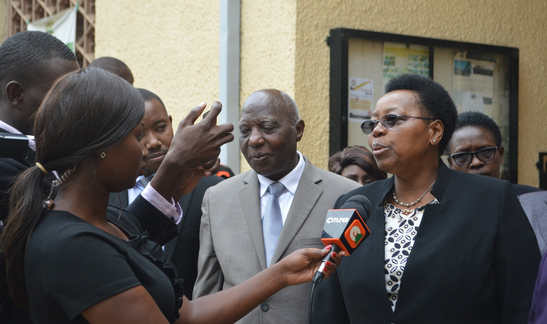STATEMENT ON OBSERVANCE OF THE INTERNATIONAL YOUTH DAY
The National Gender and Equality Commission joins Kenya and the rest of the World in commemorating International Youth Day, observed on the 12th day of August every year. This year’s theme, “Green Skills for Youth: Towards a Sustainable World’’, is aligned with the world’s green transition towards an ecologically sustainable climate-friendly global environment.
The youth form a substantive segment of the world population. In Kenya, the youth ( 18-35) constitute 29% of Kenya’s population[1]. Youth are known to drive transformation through the acquisition and application of Green Skills[2]. They are not only future innovators, and decision-makers but also have creators of new solutions. Growing up in the digital age, young people have an innate grasp of emerging technology. In many spaces, youth have leveraged digital tools and platforms to develop computer applications for sustainable living and have created successful virtual communities that promote environmental awareness and actions. Their ability to connect with peers from different cultures and regions allows for the exchange of ideas, knowledge, and best practices that accelerate the global transition to sustainability.
In Kenya and the world at large, youth have demonstrated their capacity to mobilize and influence change through positive social activism and advocacy. Their passion for social justice extends to the environment, with many young activists spearheading campaigns for the adoption of renewable energy solutions, plastic reduction, e-waste management, reforestation, and other crucial green initiatives. However, in their effort to adopt and apply green skills, youth have faced a myriad of challenges. These include; inadequate representation in the decision-making, limited access to education, training and industrial internships, inadequate job opportunities and shrinking labour markets, negative peer pressure, radicalization, drug and substance abuse, mental health, and sometimes lack of supportive legal and policy frameworks.
Kenya has made great strides in promoting and fostering green skills development and sustainability through measures such as Integrated environmental education (with livelihood skills); High skill development in technology, computing and coding in environmental science; Entrepreneurship and investments in clean energy solutions; Integration of climate-smart agriculture, agroforestry techniques, and value chain for recycled wastes; and Mentorship for young ecopreneurs, just to mention a few.
In addition, Kenya has a robust legal and policy framework, that promotes and supports youth in acquiring green skills and promoting a greener economy. For example, Kenya Youth Development Policy, 2019 obligates the Government to put in place measures that support youth engagement in environmental protection, eco-preneurship and green jobs; the Kenya Vision 2030 emphasizes the integration of green technologies and practices in manufacturing; and the Climate Change Act, No. 11 of 2016 highlights the importance of capacity-building in climate-resilient and environmentally sustainable practices.
Kenya has formulated the Green Economy Strategy and Implementation Plan 2016 – 2030 which outlines Kenya's commitment to transitioning to a green economy. Further, Kenya’s alignment with international and regional agreements and frameworks, such as the United Nations Sustainable Development Goals (SDGs) and Africa Agenda 2063 underscores its commitment to fostering green skills among the youth. During the forthcoming September 2023 Nairobi Climate Action Summit and Africa Climate Week, Kenya shall be hosting diverse groups of youth from Africa and beyond in a series of side events to showcase their role in climate change actions, mitigation, adaptation and financing.
As we commemorate this International Youth Day, the Commission applauds youth, the government and the private sector for these efforts. The Commission also calls for enhanced collaboration between state and non-state actors to equip youth with modernized green skills. We invite everyone to unite and harness the power of partnership in an inclusive green transition. We note that it is the responsibility of the state to ensure that all green skills initiatives directed to youth are aligned with principles of gender equality and nondiscrimination.
Happy 2023 International Youth Day.
Dr. Joyce M. Mutinda, PhD. EBS
CHAIRPERSON
[1] Kenya Bureau of Statistics. (2019). Kenya Population and Housing Census 2019
[2] Green skills encompass a wide range of abilities: Understanding ecological systems, adoption of innovative technology, sustainable resource management for community engagement, just to mention a few.


Comments